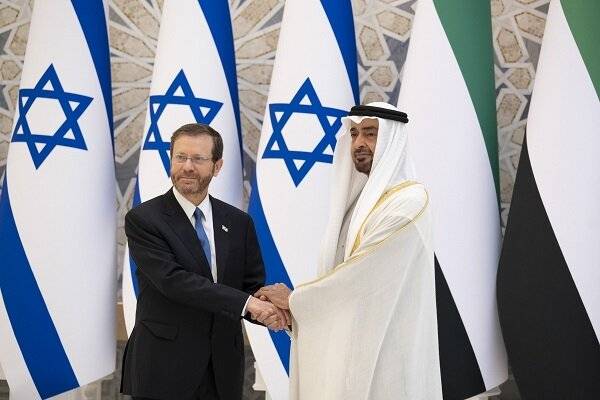1886 Views
Abu Dhabi’s Two Faces in Gaza: Public Condemnations, Secret Deals with Israel and Washington
With the intensification of the Gaza crisis following October 7, 2023, the world’s attention has been drawn not only to the military confrontation but also to the political scenarios for the “day after” the war. In this context, the role of the United Arab Emirates, as a regional player that outwardly adheres to traditional Arab stances while maintaining strategic relations with Israel and the United States, is of paramount importance.
Publicly, Abu Dhabi condemns the occupation of Gaza. Yet evidence suggests that behind the scenes, the UAE has been hosting and facilitating secret meetings with Washington and Tel Aviv to shape the future of the territory.
Abu Dhabi’s Dual Behavior
The UAE’s foreign policy regarding the Gaza crisis is a textbook example of a two-faced strategy. On the official stage, Emirati public diplomacy stresses the condemnation of “human rights violations” and the “systematic destruction of Gaza” by Israel. This stance is vital for Abu Dhabi, as it allows the country to preserve a minimum of legitimacy in Arab and Islamic public opinion, distancing itself from accusations of full complicity with Tel Aviv.
However, behind closed doors, the story is entirely different. Reports indicate that Emirati officials are actively working with their American and Israeli counterparts to draw a roadmap for post-war governance in Gaza.
This political duality is a calculated strategic choice: on one side, Abu Dhabi maintains its place in the Arab camp, while on the other, it strengthens its position as a reliable partner for Washington and Tel Aviv. This dual role allows the UAE to influence regional trends while also reaping the benefits of its Western ties.
The UAE’s Geopolitical Investment
Abu Dhabi’s cooperation in the Gaza file cannot be dismissed as a short-term reaction. It is part of a grand and ambitious geopolitical investment. The UAE is striving to position itself as the “architect of a new Middle East order” — one in which Western-aligned moderate powers take center stage, while grassroots resistance and Islamist movements are marginalized.
Participation in secret talks about Gaza’s “day after” provides Abu Dhabi with unrivaled political capital and influence. Acting as a mediator enables it to cement its role as an undeniable hub in Middle Eastern security and political equations. By shaping post-war Gaza, the UAE hopes to curb the influence of regional rivals — especially Qatar and Turkey, who enjoy closer ties with Hamas.
Alternatives to Hamas
At the core of these confidential discussions lies the question of finding a political and security alternative to Hamas — one capable of taking control of Gaza without the group’s presence. Two prominent proposals include:
1. The Return of Mohammad Dahlan: A serious option under consideration is reinstating Mohammad Dahlan, a former Fatah leader and longtime rival of Hamas. Living in Abu Dhabi for years and maintaining close ties with Emirati rulers, Dahlan is seen as a candidate to manage Gaza after the war. Advocates argue that he could establish a controllable security force and cooperate with Israel.
2. A Multinational Force: Another scenario is the creation of a multinational Arab force tasked with providing security and overseeing reconstruction in Gaza. In this case, the UAE could act as facilitator and financial backer. However, key states such as Egypt and Jordan remain reluctant to join, wary of the political and security repercussions.
The Legitimacy Challenge in Palestine
The core problem with these proposals is their lack of Palestinian legitimacy. Dahlan is deeply unpopular among Palestinians, and his return would be viewed as a foreign imposition.
Likewise, a U.S.- and Israeli-backed multinational force would be regarded as a tool of occupation, depriving Palestinians of their right to self-determination.
Any political or security arrangement imposed without the consent of the Palestinian people, and based solely on foreign collaboration, is doomed to fail. History has shown that imposed solutions in the occupied territories do not bring stability but instead reproduce resistance and deepen existing fractures. This is the central flaw in Abu Dhabi’s and its allies’ calculations.
Regional Consequences
The UAE’s policies toward Gaza carry wide-ranging implications for the region. Chief among them is the deepening rift between the Resistance Axis and the normalization bloc. On one side, the Resistance vehemently condemns such backroom negotiations as a betrayal of the Palestinian cause. On the other, states normalizing ties with Israel — such as the UAE, Bahrain, and Morocco — stand in opposition. This confrontation not only jeopardizes regional stability but also risks fueling further proxy conflicts.
Additionally, intra-Arab competition intensifies. The UAE’s activism pits it directly against Qatar, which has long positioned itself as Hamas’s supporter by hosting its leaders. Turkey, too, with its already tense relationship with Abu Dhabi, seizes the opportunity to criticize Emirati policies and bolster its own standing in the Muslim world. In the long run, this geopolitical gamble could come at a heavy cost, eroding the UAE’s legitimacy among Arab and Islamic populations.
Conclusion
By playing on two contradictory fronts, the UAE is engaging in a high-risk geopolitical gamble. On one hand, it maintains its Arab credentials with public condemnations; on the other, it strengthens its Western and Israeli alliances by helping design Gaza’s post-war future. The driving motive is Abu Dhabi’s ambition to become the chief architect of the Middle East’s new order and sideline its regional competitors.
However, neglecting the fundamental question of Palestinian legitimacy is the gravest weakness of this strategy. Proposals such as reinstating Dahlan or deploying a multinational force, without Palestinian consent, are bound to fail — perpetuating cycles of violence and instability. Moreover, these policies will inevitably deepen the divide between the Resistance Axis and the normalization bloc, placing regional stability at even greater risk.
*Translated by Ashraf Hemmati from the original Persian article written by Mohammad Saleh Ghorbani

Comment
Post a comment for this article